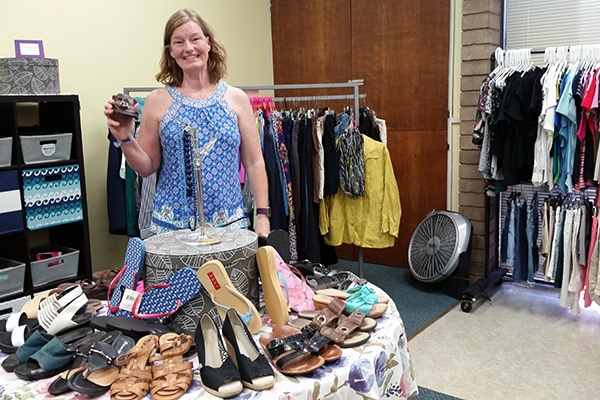Special Blog Post By Caitlin Kerk
Alys Milner’s earliest memory of food insecurity is when she was 9 years old and there was no food in the house.
“It was the night before payday and my mom was literally out of food,” she said. “I remember her making biscuits with flour and water, and the four of us sitting around the table, scraping jam out of the jar.”
Alys understands the importance of nutritious food because she’s lived it. She watched her mother struggle to put food on the table for her and her two sisters.
“It’s terrifying not to know if there’s going to be food,” Alys said.
Now that she is in a position to give, she wants to ensure that everyone has the nutritious food they need to thrive. Alys and her husband have been donating to Second Harvest for 20 years.
“It seemed like an obvious choice,” Alys said. “I think so highly of the organization on multiple levels. It fills a fundamental need – to feed people who would otherwise go without. I’ve read a lot about hunger and malnutrition from an early age. It impacts brain development. Kids don’t do well in school. Your long-term health suffers. I also appreciate Second Harvest’s focus on nutrition. It’s about getting people healthier food and helping them understand about nutrition.”
Sacrificing nutritious food for housing
“My mother prioritized having a roof over our heads instead of food, just like so many families are forced to do now,” she said. “I would do the same thing.”
Alys was born in Canada and moved to California in 1966 with her family – her mom, dad and two sisters. But by the time their visas cleared, the nursery that had hired her father filed for bankruptcy. The family went an entire year with no income.
“We had sold our house in Canada, but we used up most of our savings that first year,” she said. “Dad finally got back on his feet, but a year later he was diagnosed with lung cancer. Any savings went to that. We were wiped out.”
Her father died when Alys was 9 and her sisters were 8 and 14. Her mother was alone in a new country with three kids.
“There was my mom, all of her savings gone,” Alys said. “My parents had worked hard, bought a house in Canada. But then my dad doesn’t get paid for a year, and he gets lung cancer. How are any of these events their fault? That’s why it bothers me when people say, ‘if they would just try harder.’ My parents tried very hard.”
Eventually her mother got a job in San Francisco as a clerk typist. But money was tight, and there was little left over for food.
“We lived in a two-bedroom apartment in Millbrae; just the four of us sharing a tiny apartment,” she said. “We had no car, no TV. If I got sick, I felt so guilty. We didn’t have medical insurance. Mom would have to set up a payment plan.”
Alys struggled with food insecurity throughout college as well. She worked part-time at a minimum-wage job while going to school full-time. She received a degree in theater arts with an emphasis on costume design.
“I worked in the theater office and there was a woman there who would save me her crackers,” she said. “If I got invited to a party, it was all about the food.”
Now married with two children, Alys lives a modest life and stays focused on helping others.
A safe place for women
She volunteers for Front Door Communities, one of Second Harvest’s partner agencies. Second Harvest distributes food through a network of 309 nonprofit partners, including schools, pantries, community centers and shelters. Front Door Communities is based in downtown San Jose and serves people who are homeless. Alys spends most of her time working in the Lifted Spirits drop-in center for women.
“We offer a safe place for women to get off the streets for an afternoon,” she said. “Women are often the victims of physical abuse. It’s hard for them to stay safe. We have a quiet room where they can sleep safely.”
The Lifted Spirits drop-in center is open three days a week and serves 25 to 40 women a day. Women can get a hot meal and select up to eight items from an onsite pantry that Second Harvest helps keep stocked with canned foods and other items that can be eaten without needing a kitchen. Women can also take one of the bagged lunches that Front Door Communities provides to anyone who needs it – men and women.
Alys – a professional organizer – used her skills to organize the boutique, where women can choose from an array of donated clothes, shoes and accessories. She works in the boutique two days a week.
Even though she is comfortable now, she still remembers being food insecure.
“There is a little residual that never goes away,” she said.
